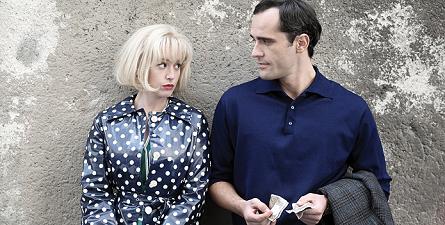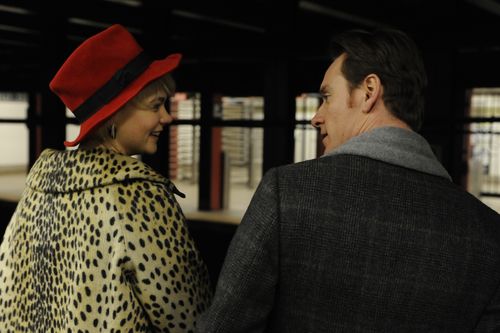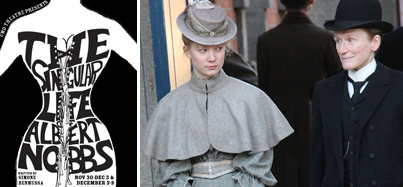TIFF: Ludivigne, Fassy and Glenn
 Monday, September 12, 2011 at 8:00AM
Monday, September 12, 2011 at 8:00AM Paolo again. Despite some minor screw-ups and nervous breakdowns, here I am to report on TIFF Day 4, which brought more polished kind of movies than the ones that I've seen in the past three days.

I saw Christopher Honore's Beloved as a recommendation by the TIFF Twitter account because I said that my two favourite movies were A Streetcar Named Desire and Do the Right Thing. Now I wonder what they would have said if I wrote that my top two are The Conformist and The Big Sleep.
Beloved begins with a sequence of a Roger Vivier boutique where its customers try out the heels that the shop sells. Different colours, skins, anything a girl wants. A young shop employee named Madeleine (Ludivigne Sagnier, recently interviewed right here) steals a pair and by wearing it she's mistaken for a prostitute. That's only one of the things that are difficult to swallow here, prostitution treated as something that Madeleine can get in and out of. Also incredulous is her daughter Vera (Chiara Mastroianni) turning a gay man (Paul Schenider) straight, the opposite of what happens in Honore's Love Songs where a straight man turns gay. Honore tackles the fluidity of human sexuality in his films, as characters deal with being guilty of or the victims of infidelity. It's very open to, say, the Freudian nature of love where parents see their lovers within their children. Madeleine embodies that ambivalence and, since this is an Honore film, she occasionally sings these issues out.
The joke, of course, is that the adult version of Madeleine has to played by Mastroianni's real life mother, Catherine Deneuve and thus the younger Madeleine has to copy the older actress's younger self. The scenes set in 1964 make the comparison slightly unconvincing, but the non-linear film fast forwards into the late 70's to better results. It's scary how Sagnier nails Deneuve's essence, and it's not just the former's hair doing all the work. There's this snark that both have, this sexy cynicism that mirrors one with the other. Now if anyone can explain to me what the Prague Spring and 9/11 really have to do with these women's love lives...

Now there's my favourite movie forever this day, Steve McQueen's Shame. His previous work Hunger succeeds in making its audience marvel at his aesthetics in those film's first few minutes. Shame doesn't do this (at first) making the shots and the characters' actions within the frame more cyclical. It almost scares us into thinking that the movie will just be protagonist Brandon (Michael Fassbender) waking up and ignoring his sister Sissy's (Carey Mulligan) needy voice messages for a hundred or so minutes.
It's not until the entrance of the supporting cast that the film is humanized. Shame & Albert Nobbs after the jump.
Brandon has a boss named David (James Page Dale), the kind of guy who buys random girls shots and still talks like he's in college to compensate for the fact that he's a thirtysomething suburbanite. A few minutes later, Sissy decides to move in, unannounced. She has keys. I wasn't a big Mulligan fan before this screening, but she delivers her characters' lines with such boisterousness that I've decided that she would make the greatest sister ever and that if I was Brandon, I would have let her overstay her welcome and indulge her with money and parties every night.
But unlike David and Sissy, who surprisingly hit it off the first time they meet, Brandon is both a withdrawn party pooper and a sex addict (One of the film's earlier scenes is his work computer confiscated for virus inspection). I'd ask you to try to figure why he's both if the film didn't make us clearly understand and examine his conundrum. Depending on who you talk to, Fassbender's transformation as Brandon is pale and skeletal. He prefers solitude and depending on who you ask, his anomie in a big city like New York either encourages his depravity or it's something innate. And of course, the visuals get more subtle and better, the long takes, including the ones depicting the conversations between Brandon and Sissy are to die for and Brandon's downward spiral is so intense that the audience can't help but go along with the ride. Amir, The Film Experience's other TIFF correspondent, who I met last night, will also be discussing what he liked about the film.

The last film on today's docket is Rodrigo Garcia's Albert Nobbs. I suppose I should have saved my age-difference criticism here, but the relationship between titular Albert (Glenn Close, who also co-wrote and produced the film) and Helen (Mia Wasikowska) is mostly co-dependent. Albert pursues her because aspiring merchants have parlour rooms for their wives, his 'love' for her might be more programmed than he thinks. This movie is like Jack Goes Boating but set a century back. Helen tries to get Albert to give her money that she'll use to go to America with her other boyfriend, Joe (Aaron Johnson). But these allegiances don't follow the same linear trajectory that other stories would have.
But did we really need all that set-up, to discover everyone's back story through slowly delivered soliloquys? I also keep imagining what would happen if the film hired a relative unknown to play Albert, the credits not rolling until the end. He have a first glance on Close's face and the rush in discovering that Albert is actually a woman disappears.
In the scenes with their awkward courtship, Close eventually drops her Irish accent to bare her soul on Wasikowska's way while the latter has the 'I'm too cool for you' inflection, Helen being distant against him until he buys her stuff. The shining light in this film is Janet McTeer as Hubert Page, nailing a masculine gait as well as expressing emotions such as outrage just by standing in front of the camera.The most enjoyable scenes are ones between Albert and Hubert, the only characters who feel free with each other.
And sure, whenever there's a close-up, half of the screen is blurred. But I'd also like to say that this is the most gorgeously shot film I've seen so far. The greens and the yellows are just so deep and full and tangible. And just like an earlier Glenn Close movie called The Big Chill, this one ends in symmetry. Too bad about the pacing, which only quickens just in time for the film's denouement. This makes you feel that that all of its parts between crucial scenes were merely fluff.



Reader Comments (3)
Seems like Close's nod is getting further from the sure thing it first appeared as.
That's soooo sad. But I still think she could nail a spot in the best actress category even if Janet McTeer is better than her (but how someone could be better than Close? Maybe it's just the role or the wrong director...) and the movie sucks.
Seems everyone likes Mulligan and McTeer a lot!